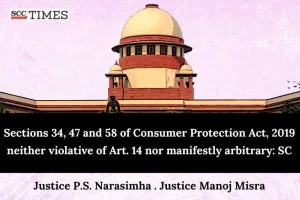Supreme Court: While considering the instant petition concerning challenge to the constitutionality of Sections 34(1), 47(1)(a)(i) and 58(1)(a)(i) of the Consumer Protection Act, 2019 for being violative of Article 14 for prescribing pecuniary jurisdictions of the district, state and national commissions on the basis of value of goods and services paid as consideration, instead of compensation claimed; the Division Bench of P.S. Narasimha* and Manoj Misra, JJ., dismissed the challenge and declared that the said provisions are constitutional and neither violative of Article 14, nor manifestly arbitrary.
The Court further held that Central Consumer Protection Council and the Central Consumer Protection Authority shall in exercise of their statutory duties under Sections 3, 5, 10, 18 to 22 take such measures as may be necessary for survey, review and advise the government about such measures as may be necessary for effective and efficient redressal and working of the statute.
Background and Legal Trajectory:
The petitioner’s husband purchased a sedan —Ford Endeavour Titanium car from S.P. Vehicles Pvt. Ltd., authorised dealer of Ford India for an amount of Rs. 31.19 Lakhs. Tragically, the vehicle caught fire on 20-11-2018 while being driven leading to death of petitioner’s husband. The petitioner initiated criminal and statutory proceedings under CP Act by way of consumer complaint before the District Consumer Commission, Vadodara for compensation of Rs. 51.49 crores with interest.
Pending disposal of the consumer complaint, the appellant approached the Supreme Court by way of the present writ petition under Article 32 of the Constitution alleging that she was compelled to approach the District Commission because of the statutory regime under the 2019 Act; whereas under the repealed Consumer Protection Act, 1986, she could have directly approached the National Commission (NCDRC) based on compensation claimed.
In the clubbed civil appeal, the appellant’s husband, a District governor of the Lions Club of Jhansi, passed away due to COVID-19 on 25-07-2020. When her claim on the basis of insurance policy offered by Lions International Club, up to two million dollars as compensation to families of deceased members was denied, she approached the National Commission seeking Rs. 14.94 crore. However, the National Commission rejected her petition on the ground that the consideration for the insurance policy does not exceed Rs.10 crores.
Counsels for the petitioner and appellant contended that under the new legal regime, an anomaly has arisen regarding pecuniary jurisdiction and hierarchy of judicial system.
Court’s Assessment and Findings:
Perusing the facts in the writ petition and the appeal the Court determined that issued can be considered in the context of (i) power to determine pecuniary jurisdiction, (ii) reasonable classification under Article 14, (iii) manifest arbitrariness, and (iv) loss of remedy.
Vis-a-vis the power to determine pecuniary jurisdiction, the Court stated that Parliament has the legislative competence to prescribe jurisdiction and powers of courts. This power extends to prescribing different monetary values as the basis for exercising jurisdiction.
Regarding submissions that the impugned provisions of the CP Act are discriminatory and violative of Article 14, the Court pointed out that Sections 34, 47 and 58 vest jurisdictions in the district, state and national commission on the basis of value of goods or services paid as consideration. The precise question that requires consideration is whether empowering the district, state and national commissions to exercise jurisdiction on the basis of value of the goods or services paid as consideration is violative of Article 14.
Relying on State of West Bengal v. Anwar Ali Sarkar, (1952) 1 SCC 1, the Court pointed out that if there is one test for determining whether a provision of ‘law’ is violative of the equality norm, which has been articulated with precision and clarity, it is the independent and interconnecting twin test i.e., the classification must be founded on an intelligible differentia which distinguishes those that are grouped together from others, and that that differentia must have a rational relation to the object sought to be achieved by the Act.
The Court explained that Classification based on value of goods or services on the basis of the amount paid as consideration is valid. “Consideration” is an integral part of forming any contract. It is also an integral part of the definition of a ‘consumer’. The Court further explained that it is in recognition of the first principles of formation of a contract that Section 2(7) of the CP Act defines a consumer as any person who buys any goods or hires or avails any service for a consideration. The consideration could be in the present or future, in whole, part, or by deferred payment. Whichever be the mode, there must be a consideration. That is essential to be a consumer. Therefore, vesting jurisdiction in the District, State or National Commission on the basis of value of goods or services paid as ‘consideration’, is neither illegal nor discriminatory. Elaborating further, the Court stated that this classification also has a direct nexus to the object sought to be achieved. It is thus not a suspect classification. Value of consideration paid for good or service purchased is closer and more easily relatable to compensation than the self-assessed claim for damages of a consumer.
“It is clear that the determination of jurisdiction of the district, state or national commissions on the basis of value of consideration paid for purchase of goods and services has a rational nexus to the object of provisioning hierarchy of judicial remedies”.
The Court further stated that there has been no loss of judicial remedy because of Sections 34, 47 and 58 of the CP Act. The relief or compensation that a consumer could claim remained unrestricted and at the same time, access to the state or the national commission is also not taken away. It is well settled that there is no right or a privilege of a consumer to raise an unlimited claim of compensation and thereby chose a forum of his choice for instituting a complaint.
Therefore, the Court held that there is no unrestricted claim for compensation and that it is subject to the determination of the court; and that classification of claims based on value of goods and services paid as consideration has a direct nexus to the object of creating a hierarchical structure of judicial remedies through tribunals.
Vis-a-vis performance audit of the statute, the Court stated that reviewing and assessing the implementation of a statute is an integral part of Rule of Law. It is in recognition of this obligation of the executive government that the constitutional courts have directed governments to carry performance audit of statutes.
In the context of conducting performance audit of a statute, the Court recognised the constitution and establishment of two statutory bodies- the Central Consumer Protection Council (Council) under Section 3 of the CP Act and Central Consumer Protection Authority (Authority) under Section 10 of the CP Act. The Court pointed out that purpose and object of constituting these authorities is clearly reflected in the Preamble of the CP Act. The purpose and object behind referring to the constitution and functioning of the Council and the Authority is only to ensure that the regulatory regime for consumer protection is clearly identified, coordinated — if not centralised and declared to be duty bearers for effective functioning of the consumer protection regime.
“The power of judicial review in matters concerning implementation of policy objectives should transcend the standard power of judicial review to issue writs to perform statutory duty and proceed to examine whether the duty bearers, the authorities and bodies are constituted properly and also whether they are functioning effectively and efficiently”.
Therefore, the Court declared that the Council and Authority being statutory authorities having clear purpose and objects and vested with powers and functions must act effectively and in complete coordination to achieve the preambular object of the statute to protect the interest of consumers. As they are impressed with statutory duty, their functioning will be subject to judicial review. Vibrant functioning of the Council and the Authority will subserve the purpose and object of the Parliament enacting the 2019 legislation.
CASE DETAILS
|
Citation: Appellants : Respondents : |
Advocates who appeared in this case For Petitioner(s): For Respondent(s): |
CORAM :


